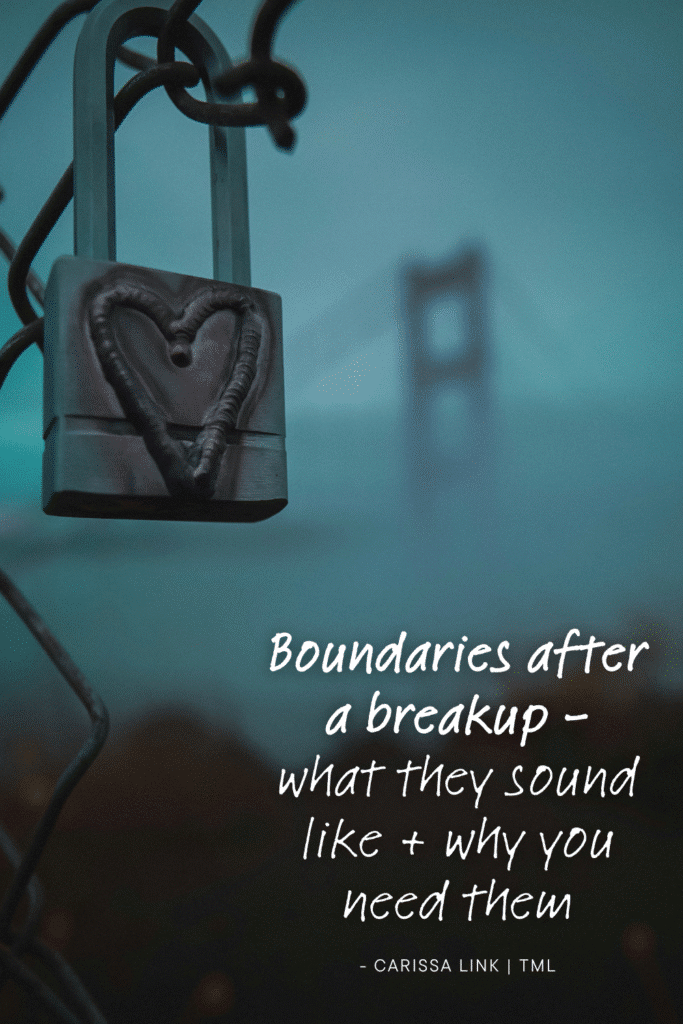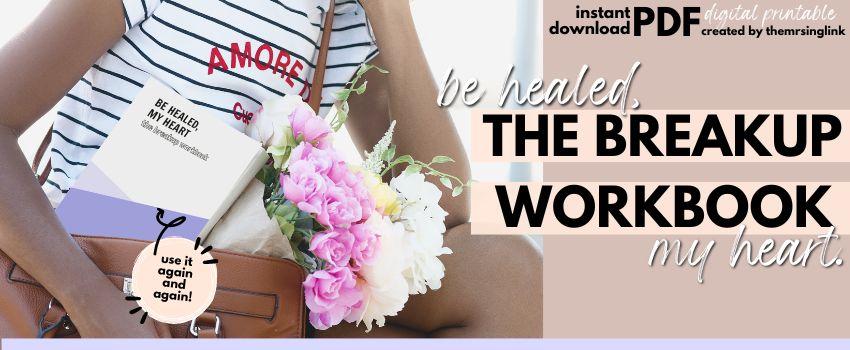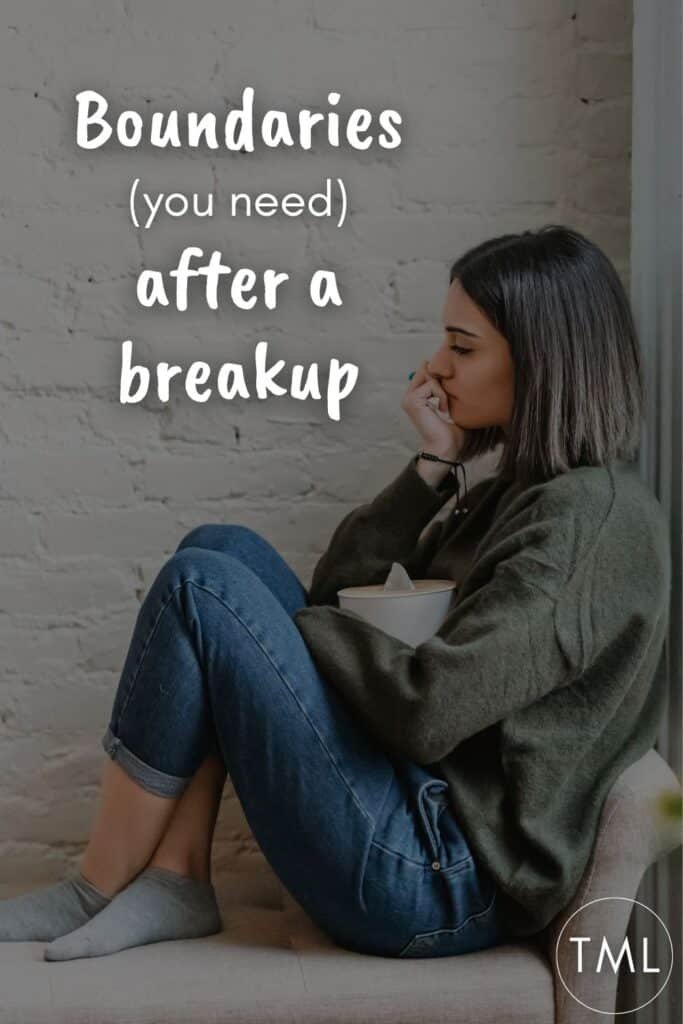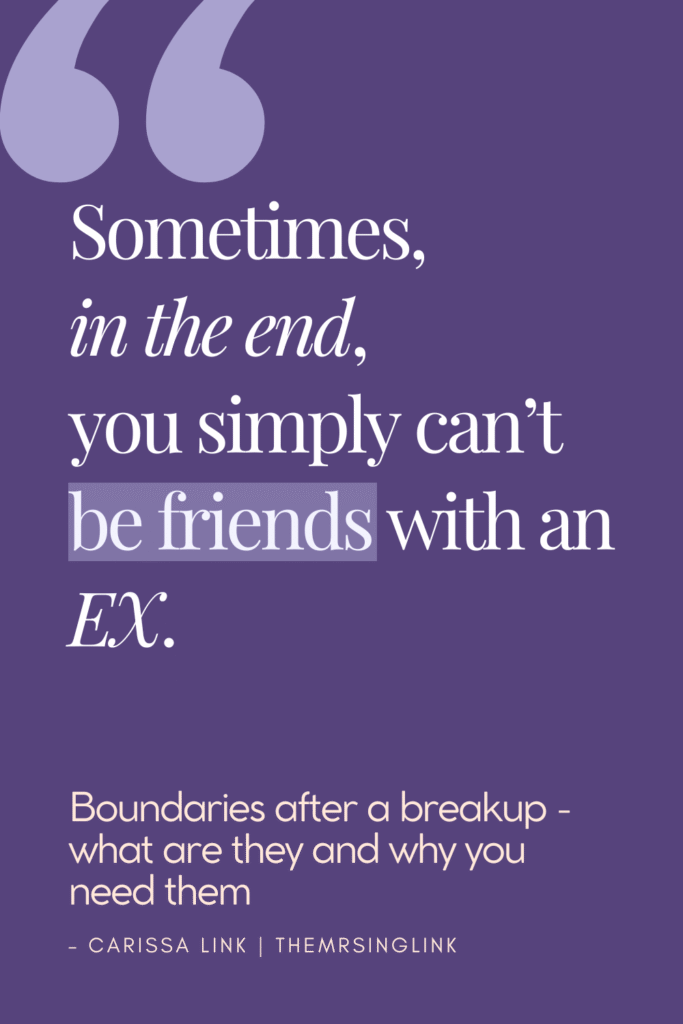10+ Examples of setting boundaries after a breakup
Breakups are hard. Setting and honoring boundaries after a breakup can be even harder.
The most crucial part about heartache is the scared, lost, and deeply wounded inner child that is screaming out for help – to be seen, heard, and healed. And for many following a breakup, there is a continuation of self-betrayal through repetitive patterns that inhibit or prevent true healing.
This is why healthy boundaries after a breakup are so important, not only for you but for the other person involved. Boundaries are an act of self-care, and when you are in the thick of heartbreak is when they are needed most.

The ‘No-Contact’ Rule
The applied rule involves not seeing each other – even as a means of continually trying to gain closure or “make amends” – as well as responding to or initiating calls, texts and advances.
I see you lurking through their socials (even if out of innocent “curiosity”) – this is also included in the ‘No Contact’ boundary.
When you maintain physical and/or emotional ties it can make it that much more difficult to cut them in order for you to fully grieve/heal (aka move on from that relationship).
What this boundary sounds like
- “I am not ready to talk. If I am ready, I will be the one to reach out.“
- “It’s important that I focus on my own healing and I can’t do that when you continue to drop in to ‘catch up’, ‘check in’ on me or conjure up revelation in your means for more clarity or closure.“
- “When we try to stay in contact, more often than not, we end up rehashing the reason for our breakup in the first place. Therefore, it’s in our best interest not to continue this cycle and not engage with one another.“
- “Stop contacting me when you’ve been drinking – it’s not authentic nor is it helpful for me in moving on.“
- *This boundary also sounds like silence, too. And, no, this is not considered ghosting.
Delete, block, repeat
If the above is especially a greater struggle for you, then it is critical to set a boundary for yourself that is more set in stone. This requires removing yourself or aspects of them entirely from your everyday life or social life. This may be as simple as deleting their number or going as far as disconnecting from mutual friends.
I’m sorry for those who have their partner’s number memorized, yet the ‘Delete, block, repeat‘ can still be very helpful because the idea is hopefully and eventually “out of sight, out of mind.” It’s a lot easier to forget something that isn’t within reach or dangling in your face, like those framed photos you keep on your nightstand, or the hundreds just a tap away on your phone.
To redirect your thoughts and habits toward healing will require taking emotionally enormous steps – steps that are obviously uncomfortable and rather permanent. This can be more difficult than the actual breakup itself.
By doing so, you will feel less tempted to reach out or respond by deleting and/or (when/if necessary) blocking their number. Deleting and blocking their socials will also prevent you from re-stimulating residual, emotional ties to the relationship and it will help you avoid certain triggers (i.e., seeing your ex post that picture of them seemingly having a blast with the boys, taking on new adventures or on a date).
Everyone has had the experience of feeling like they’ve taken ten steps forward, only to “peek” at their ex’s socials (or get no response to that text) and that set them fifteen steps back. Sure, everyone’s heartbreak recovery process is different, including how long it takes. Some will even say they never or fully move on, and that this is part of the human experience.
It’s important to remember that there may be certain things holding you back, that you’re not ready for or to let go of…and that these things can negatively contribute to the process of moving on.
[Related Read: Are opposite sex friendships a threat in marriage?]
What this boundary sounds like
- *To yourself, “I deserve to feel whole again, and in order to do that I must eliminate all the things within the environment that made/makes me sick.“
- *To yourself, “I forgive myself for ____________(allowing our happy memories to overshadow maltreatment). In order to fully let go I need to _____________ (get rid of our memorabilia).
- *To yourself, “Whenever I see […]’s posts show up on my feed, I get this sickly sinking feeling, and when that happens it usually effects my mood the rest of the day (or for days) and will even lead me to engage in behaviors that reinforce that feeling (such as impulsively reaching out to them). To stop enabling this, I need to remove […] from my social media.“

It’s OKAY to fall apart, disengage, and go off the radar
Sometimes heartbreak forces us to hit rock bottom, even in ways we may not be proud of. The way you grieve/heal from a breakup will be a totally different process from another.
You will need to give yourself some grace, even if that means powering down your phone after work (literally), declining certain social functions, or informing those closest to you when and where you need some space. That’s OKAY.
Prioritizing the space and allotted time to process your feelings is not something to feel ashamed or guilty about – others should be able to extend the same grace you give yourself.
Maybe you need to temporarily deactivate your own socials (or get rid of them altogether) in order to avoid icky feelings that pop up when happy couples share their big milestones, or that they’re simply ‘happy’ in a time you’re not. This is OKAY.
This doesn’t equate to you not being happy for them or that you don’t wish others happiness.
More importantly, you’re likely feeling the pressure of spilled over emotions (you’re struggling to keep the lid on, let alone tight), and this can bring about more shame and guilt in times you find it impossible to be supportive, emotionally present or connected to those around you. That’s OKAY, too.
With boundaries after a breakup, you can still be loving and kind to others while honoring your capacity.
To prevent from falling apart completely, many tend to mask and ignore the hurt, or they use something/someone else as a way to cope. Many wind up imploding, exploding, or perpetuating unhealthy patterns [i.e., onto others, in other areas of life].
Acknowledging your pain more tenderly by allowing yourself to feel and to fall apart in order to piece back together (if that’s what it takes), IMO, makes you that much more resilient and self-connected than the other way around. Besides, without feeling and understanding sadness you can’t know what true happiness is.
What this boundary sounds like
- To coworkers, “My absence is nothing personal; please respect my need for some personal time in leu of my recent breakup.“
- *To yourself, “Seeing other couples posting on social media is triggering for me, so I need to deactivate for a while in order to process the emotions I’m going through.“
- To family, “Our relationship is important to me, but I require some much needed solitude at the moment.“
- To friends, “Our friendship is important to me, so please understand I am not able to give you the support you need at this time.“
Sometimes, in the end, you just CAN’T be friends
I see this well too often – those who make any and every attempt to remain “close” or civil with an EX that extends beyond the simplicity of having “ended things on good terms”.
Many genuinely fear disconnecting (detaching) from an ex-partner, whether the relationship was good or bad. Some will wonder why it feels impossible to efficiently move on from their relationships and form new ones, why they’re having certain difficulties maintaining healthy relationships, or why they take it personal when an ex-partner has the capacity to, quite literally, abandon them in the wake of heartbreak.
The reality is…sometimes you don’t get to choose whether or not you stay connected after a breakup, nor is it ALWAYS beneficial to be friends. There may come a point when boundaries trump your desire to hold onto a connection that no longer serves you (or them).
[Related Read: First date red flags to STOP sweeping under the rug]
What this boundary sounds like
- To your EX, “I will no longer engage with you for as long as [I, you, we] continue to relapse back to [my, your, our] old, destructive ways.”
- *To yourself, “Since it is clear that they do not have interest in remaining civil/friends, I need to respect their choice in doing what is best for them and I owe it to myself to doing the same and focus on moving forward.“
- To your EX, “I care about your well-being and wish only the best for you in life, but it’s not in my best interest that we remain friends.“
- To your EX, “I simply cannot move on and start a new, fresh relationship with feelings for another when I am still connected to you. That isn’t fair to you or the other person I’m involved with, so I need to honor and respect my newfound connection moving forward.“

